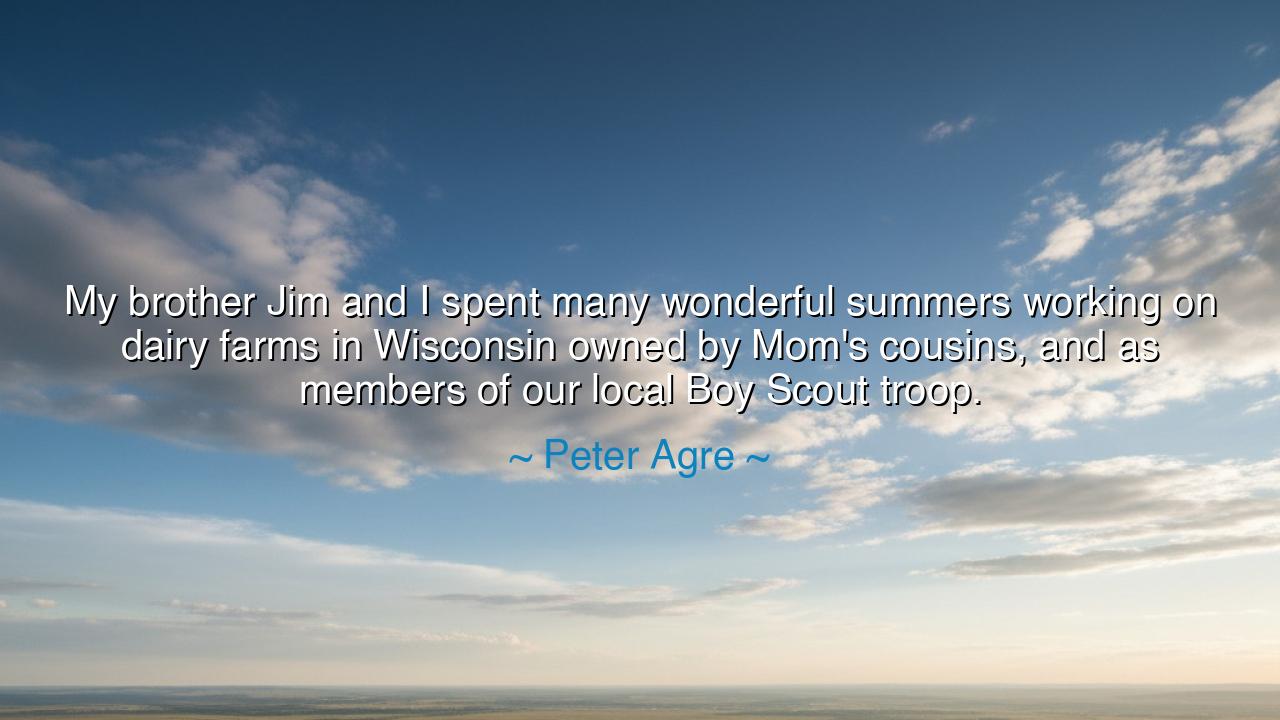
My brother Jim and I spent many wonderful summers working on
My brother Jim and I spent many wonderful summers working on dairy farms in Wisconsin owned by Mom's cousins, and as members of our local Boy Scout troop.






Peter Agre, Nobel laureate and son of the Midwest, once recalled with warmth: “My brother Jim and I spent many wonderful summers working on dairy farms in Wisconsin owned by Mom’s cousins, and as members of our local Boy Scout troop.” In these simple words lies not just nostalgia, but a testimony to the formative power of labor, kinship, and community. His memory is not about science or discovery, but about the humble soil in which his later greatness was planted.
At the heart of this reflection is the value of work. To spend summers on the farm, rising with the dawn, tending to the cattle, sweating under the sun, is to learn discipline not from books but from the earth itself. The dairy farms of Wisconsin, rich with tradition, are schools of patience and endurance, where every day one sees that life is sustained by toil. Agre and his brother were shaped by this rhythm, carrying into their adulthood the lessons of diligence and responsibility first learned among the barns and pastures.
But his words are also a hymn to family. These were not anonymous fields—they were the lands of his mother’s cousins. To labor there was not merely work, but a participation in heritage, a link to the wider bonds of kinship. In such settings, children learn that their story is not theirs alone, but woven into a larger fabric of ancestry and relation. The cousins’ farms became both livelihood and lineage, places where family roots were nourished as deeply as the soil.
The Boy Scouts added another dimension. Where the farm taught labor, the troop taught service, honor, and camaraderie. Around campfires, on hikes, in acts of community service, boys were shaped into men who would carry forward the values of loyalty, courage, and resourcefulness. History is filled with leaders, explorers, and thinkers who credited scouting or similar rites of passage with giving them their first vision of responsibility to others. In this, Agre’s memory is not singular but part of a great chorus of those who were forged in such youthful brotherhoods.
Consider also how many of the great minds of history arose not from gilded palaces but from humble beginnings. Abraham Lincoln, splitting rails and working the soil, found in hardship the discipline that would carry him to greatness. Marie Curie, raised in a modest Polish household, learned perseverance long before she discovered radium. Peter Agre’s words remind us of this same truth: that the greatest discoveries are often born in the hearts of those who first learned to work with their hands, to respect the sweat of honest labor, and to treasure the bonds of family and community.
The deeper meaning here is that character is formed not in the heights of recognition but in the unseen labors of youth. The summers on the farm, the hours in the Boy Scout troop, were not glamorous, but they cultivated resilience, humility, and joy—qualities that no education can replace. The world often seeks brilliance without roots, but Agre reminds us that brilliance grows best in soil enriched by tradition, family, and shared labor.
The lesson for us is clear: seek out those formative experiences that bind you to earth, to community, and to heritage. Do not despise the humble chores, the family tasks, the hours of quiet service, for they are the hidden forge of greatness. For parents and teachers, the call is to give children opportunities not only to learn in classrooms but to labor with their hands, to serve others, and to belong to communities that shape their spirit.
Thus, Peter Agre’s memory, though simple, becomes a parable. In the dairy farms of Wisconsin and the Boy Scout meetings of his youth, he found the seeds of the man he would become. May we, too, embrace the humble soil of our upbringing, and may we pass forward to the next generation the same gifts of work, family, and community, that they may grow strong enough to face the world with wisdom and courage.






AAdministratorAdministrator
Welcome, honored guests. Please leave a comment, we will respond soon